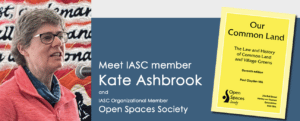Support us from £3/month
We deal with almost 1000 cases a year assisting communities, groups and individuals in protecting their local spaces and paths in all parts of England and Wales. Can you help us by joining as a member?
Our general secretary, Kate Ashbrook, recently spoke to the International Association for the Study of the Commons to give a history of Open Spaces Society and our work. The article below appeared in the IASC newsletter.

Our general secretary, Kate Ashbrook, recently spoke to the IASC. Photo: IASC
I am Kate Ashbrook, and have been the general secretary (chief executive) of the Open Spaces Society since 1984. I am a campaigner, championing the rights of the public to enjoy open spaces and public paths, through use of the law and lobbying techniques.
The Open Spaces Society is Britain’s oldest national conservation body, campaigning for common land, village greens, open spaces, and public paths throughout England and Wales. We were proud to be the first winner of the Elinor Ostrom Award for Practitioners in 2013.
The society was founded in 1865, when commons were threatened with industrialisation and development. Our lawyers helped the common right-holders to defend the commons, and we saved many spaces, such as Hampstead Heath, Wimbledon Common, and Epping Forest in London. Commons are special for their history, culture, natural beauty, and flora and fauna, and as places for public enjoyment.
In 1965 the Commons Registration Act required all commons, their rights and owners, to be registered. In 2000 we won the Countryside and Rights of Way Act giving people the right to walk on all commons. The laws protecting commons remain inadequate, and people can all too easily get away with encroaching on them.
We give advice and assistance to our members, through our publications, website, and case officers. Recently we published the seventh edition of our book Our Common Land: the Law and History of Common Land and Village Greens. This is a comprehensive guide to the law and practice of commons. It can be obtained here.
I discovered the IASC in 2008 when I was invited to participate in the global conference held at Cheltenham in the UK. The society then became an institutional member. I have since attended many global conferences, and some European ones. As I learned more about the organisation, I wanted to strengthen the role of practitioners within it. Scholars and workers in the field need each other to further the cause of commons in the widest sense, and I believe that IASC has a vital role in bringing these disciplines together for the common, and commons’, good. I really appreciate learning from all who attend the conferences, and the society finds membership of IASC extremely worthwhile.
We are always pleased to hear from scholars and practitioners who are working on commons. While the commons of England and Wales have laws steeped in history, they have many similarities to the global commons which we all seek to defend.
